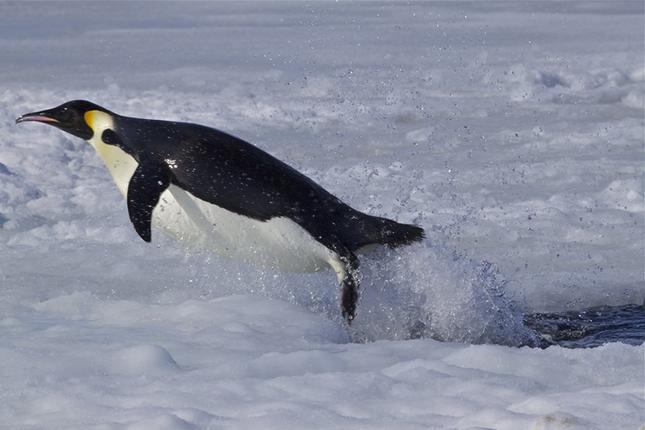It Sounds Cool, Too: ‘Frozen Planet’ at Wolf Trap
By • September 12, 2013 0 1155

When it comes to composing music, the 61-year-old British composer George Fenton has done just about everything—composing music for films, plays, television, even in his youth slinging a guitar in a rock band.
But when he talks about his work on “Frozen Planet,” for which he composed the score, you get the idea that the whole experience—it’s part of three BBC Naturalist Film Documentaries which include “Blue Planet” and “Planet Earth—has utterly moved him.
Fenton will be conducting the National Symphony Orchestra at Wolf Trap’s Filene Center Friday, June 28, while “Frozen Planet,” a two-hour distillation of the multi-part BBC Series will be viewed giant-screen style by the audience.
“It’s quite an experience, I must say,” said Fenton, who is a veteran of more than 70 films, including Richard Attenborough’s “Gandhi” and “Cry Freedom,” as well as “The Fisher King” and “Groundhog Day.” “It’s unlike anything I’ve ever done.” He has worked on a number of wildlife television programs for BBC, which marked his entry into big budget wildlife documentaries.
“It’s something new, certainly, but I feel, as I’ve gone along, that it’s very important work,” he said. “I went with the film-makers to the Arctic Circle for a time on location, and it was a revelation. It’s overwhelming, profound, the life forms, the rhythm of life there, the grand sculptures of ice and landscape, the creatures there. And, while I’m no expert, you get a real sense of something passing, too. You know the icecaps are melting. You’re keenly aware of what’s happening.”
Fenton’s work—looking at some clips gives you a fair sense of it—it’s at turns epic, sweeping, playful (when the penguins make their appearance as the crowd pleasers they are), moving, and sometimes, you get a sense of the delicate and dangerous balance in the arctic worlds that exists today.
“Yes, there is a sense of loss, because of the awareness of the disappearance of species,” he said. “But the feeling you truly get is one of awe and power.”
Being there, conducting in the pit, also lets Fenton appreciate just what these concerts are, which is a new kind of performance and film experience for audience. “I would say it’s a new form, in a way, because it mixes music and film together, but in a way that’s unique,” he said. “In a concert hall, people tend to still and listen with rapt attention, focused. In a movie theater, the music is full of cues for audiences, emotional cues even as the audience’s attention is trained on the film. In a setting like this, the audience feels more free to become involved, and I think the music is a key to that. For example, the audience is vocally thrilled and responsive to the animals. They laugh at the penguins. They’re impressed by the whales and polar bears. It makes for a unique experience, for myself and the orchestra.”
Writing music for films, Fenton feels, has changed over the decades. But he’s a deep admirer of the old Hollywood composers—like Max Steiner, famous for “Casablanca” and Korngold for “The Adventures of Robin” and later the hugely prolific John Williams, Steven Spielberg’s composer of choice.
“The early composers worked in the old Hollywood studio system and, of course, worked on all sorts of films,” Fenton said. “But the best of them—if you listen to their work—they wrote music that could stand on its own. I was inspired by them, and I’m a huge admirer of Williams and Henry Mancini.” Fenton also worked with director David Frears on television and in films like “Dangerous Liaisons,” “Hero” and “Mary Reilly.”
For “Blue Planet,” Fenton won the Ivor Novello, BAFTA and Emmy awards for Best Television scores, which was then followed by “Blue Planet in Concert.”
“We’ve taken the concept in venues all over the world,” Fenton said. “It’s been an exhilarating experience.
+++++
“Frozen Planet” is part of the National Symphony Orchestra season at Wolf Trap. Other season offerings include:
“Jerry Garcia Symphonic Celebration”—a celebration of the work and compositions of legendary and late leader of the Grateful Dead, with vocalist and guitarist Warren Haynes, June 26, 8:15 p.m.
“Carmina Burana”—the NSO and soloists from the Wolf Trap Opera Company present Carl Orff’s choral masterpiece along with Mussorgsky’s “Pictures at an Exhibition,” July 12, 8:15 p.m.
Also:
“Video Games Live: Bonus Round!”—fusion of big screen game visuals and live music, July 13.
“La Traviata”—the Wolf Trap Opera Company, the NSO and the Washington Chorus join forces for this grand opera, July 19.
“1812 Overture”—Tchaikovsky’s great work, along with Rachmaninoff’s “Second Piano Concerto” by piano prodigy Benjamin Grosvenor, July 26.
“America the Beautiful”—featured in “Ansel Adams: America,” composed by Chris and Dave Brubeck with Adams’ photographs on big screens, along with works by Copland, Gershwin and John Williams, July 27.
“Wicked Divas”—diva show-stoppers from “Titanic,” “Wicked” “Phantom of the Opera” and other works, performed by veteran Broadway soloists and the NSO; directed by NSO Principal Pops Conductor Steven Reineke, July 28.
“Singing in the Rain”—HD version of the classic Hollywood musical shown on big screen, with Gene Kelly, Debby Reynolds, Donald O’Connor and the incomparable Cyd Charisse with the NSO playing the orchestral score, August 3.

